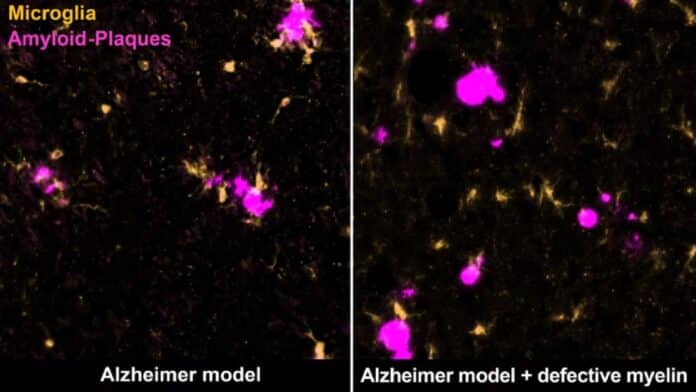In old age, the development of Alzheimer’s disease was influenced by a significant factor: poorly insulated nerve cells. Alzheimer’s disease, a neurodegenerative disorder characterized by cognitive decline and memory loss, has been linked to disrupted protective coverings of nerve cells known as myelin.
These insulation impairments can lead to the malfunctioning of brain communication and the accumulation of toxic proteins, ultimately contributing to the progression of Alzheimer’s disease. Understanding the role of nerve cell insulation in the context of Alzheimer’s disease is crucial for developing potential therapeutic strategies to combat this debilitating condition.
Alzheimer’s disease, the most prevalent neurodegenerative disease worldwide, is characterized by irreversible dementia. While age is a significant risk factor, the reasons behind this association remain uncertain. However, researchers at the Max Planck Institute (MPI) for Multidisciplinary Sciences in Göttingen have made a breakthrough discovery linking age-related degeneration of myelin, the protective layer around brain nerve cells, to promoting Alzheimer’s disease.
By slowing down myelin damage caused by aging, new avenues may emerge for preventing or delaying the progression of this debilitating condition. Alzheimer’s manifests initially as minor memory lapses and progresses to severe cognitive impairments, rendering patients dependent on care—the risk of developing Alzheimer’s doubles every five years after age 65.
“The underlying mechanisms that explain the correlation between age and Alzheimer’s disease have not yet been elucidated,” says Klaus-Armin Nave, director at the MPI for Multidisciplinary Sciences. With his team at the Department of Neurogenetics, he investigates the function of myelin, the lipid-rich insulating layer of the brain’s nerve cell fibers. Myelin ensures rapid communication between nerve cells and supports their metabolism.
“Intact myelin is critical for normal brain function. We have shown that age-related changes in myelin promote pathological changes in Alzheimer’s disease.” Nave continues.
A recent study published in Nature explored the connection between age-related myelin degradation and the development of Alzheimer’s disease. The accumulation of amyloid beta peptides, or Aβ peptides, in the brain is a crucial characteristic of Alzheimer’s. The study examined mouse models with amyloid plaques and myelin defects, resembling the conditions in human patients.
The results showed that myelin degradation accelerated the formation of amyloid plaques, as damaged myelin caused nerve fibers to produce more Aβ peptides. The myelin defects also affected microglia, impairing their ability to eliminate amyloid plaques.
These findings suggest that age-related myelin damage increases the risk of Aβ peptide deposition and potentially contributes to Alzheimer’s disease progression. Slowing down myelin degradation could lead to new therapies for preventing or delaying the onset of Alzheimer’s.
Journal Reference:
- Depp, C., Sun, T., Sasmita, A.O. et al. Myelin dysfunction drives amyloid-β deposition in models of Alzheimer’s disease. Nature. DOI: 10.1038/s41586-023-06120-6
